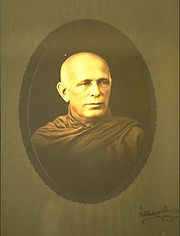
Buddhism in Germany
Encyclopedia

Arthur Schopenhauer
Arthur Schopenhauer was a German philosopher known for his pessimism and philosophical clarity. At age 25, he published his doctoral dissertation, On the Fourfold Root of the Principle of Sufficient Reason, which examined the four separate manifestations of reason in the phenomenal...
was one of the earliest Germans who were influenced by Buddhism
Buddhism
Buddhism is a religion and philosophy encompassing a variety of traditions, beliefs and practices, largely based on teachings attributed to Siddhartha Gautama, commonly known as the Buddha . The Buddha lived and taught in the northeastern Indian subcontinent some time between the 6th and 4th...
. Schopenhauer got his knowledge of Buddhism from authors like Isaac Jacob Schmidt
Isaac Jacob Schmidt
Isaac Jacob Schmidt was an Orientalist specializing in Mongolian and Tibetan. Schmidt was a Moravian missionary to the Kalmyks and devoted much of his labours to bible translation....
(1779-1847). German Buddhists or Orientalists like Karl Eugen Neumann
Karl Eugen Neumann
Karl Eugen Neumann was the first translator of large parts of the Pali Canon of Buddhist scriptures from the original Pali into a European language and one of the pioneers of European Buddhism....
, Paul Dahlke, Georg Grimm, Friedrich Zimmermann (Subhadra Bhikschu) and the first German Buddhist monk Nyanatiloka
Nyanatiloka
Nyanatiloka Mahathera , born as Anton Gueth, was one of the earliest westerners in modern times to become a Bhikkhu, a fully ordained Buddhist monk.-Early life and education:...
were also influenced by Schopenhauer and his understanding of Buddhism. But also German Indologists like Hermann Oldenberg
Hermann Oldenberg
Hermann Oldenberg was a German scholar of Indology, and Professor at Kiel and Göttingen .His 1881 study on Buddhism, entitled Buddha: Sein Leben, seine Lehre, seine Gemeinde, based on Pāli texts, popularized Buddhism and have remained continuously in print since their first publication. With T. W...
and his work ”Buddha, sein Leben, seine Lehre, seine Gemeinde“ had an important influence on German Buddhism.
In 1888 Subhadra Bickshu (Friedrich Zimmermann) published the first edition of the „Buddhistischer Katechismus“, a work based on the "Buddhist Catechism" of Henry Steel Olcott
Henry Steel Olcott
Colonel Henry Steel Olcott was an American military officer, journalist, lawyer and the co-founder and first President of the Theosophical Society....
.
In 1903 the first German Buddhist organisation was founded by the Indologist Karl Seidenstücker in Leipzig. In 1904 Florus Anton Gueth became the Theravada
Theravada
Theravada ; literally, "the Teaching of the Elders" or "the Ancient Teaching", is the oldest surviving Buddhist school. It was founded in India...
monk Nyanatiloka. Some important Pali texts were translated into German in the early part of the 20th century by scholars like Karl Eugen Neumann (1865-1915), Nyantiloka and others.
In 1922 Hermann Hesse
Hermann Hesse
Hermann Hesse was a German-Swiss poet, novelist, and painter. In 1946, he received the Nobel Prize in Literature...
published his famous work "Siddhartha
Siddhartha (novel)
Siddhartha is a novel by Hermann Hesse that deals with the spiritual journey of an Indian man named Siddhartha during the time of the Buddha.The book, Hesse's ninth novel , was written in German, in a simple, powerful, and lyrical style. It was published in the U.S. in 1951 and became influential...
", which has been translated into many languages.
In 1924 Dr. Paul Dahlke established the first German Buddhist monastery, the "Buddhistische Haus" in Berlin.
The German Dharmaduta Society
German Dharmaduta Society
The German Dharmaduta Society was founded to propagate Buddhism and establish the Buddha Sasana in Germany and other Western countries. The society was founded in 1952 by Asoka Weeraratna....
, initially known as the Lanka Dhammaduta Society and dedicated to spreading the message of the Buddha in Germany and other Western countries, was founded in 1952.
In 1957 The German Dharmaduta Society purchased the premises of "Das Buddhistische Haus" from the heirs of Dr. Dahlke. It is now a Centre for the spread of Theravada Buddhism in Europe. As the second oldest Buddhist institution in Europe, German authorities have designated it a National Heritage site.
According to the Deutsche Buddhistische Union (German Buddhist Union), an umbrella organisation of the Buddhist groups in Germany, there are about 245,000 active Buddhists in Germany (as of 2005 http://www.remid.de/remid_info_zahlen.htm), 50% of them are Asian immigrants. They are organized in about 600 groups. In 1977 there were just 15 Buddhist groups.
Literature
- Hellmuth Hecker: Chronik des Buddhismus in Deutschland. 3. Aufl. Deutsche Buddhistische Union, Plochingen 1985
- Jürgen Offermanns: Der lange Weg des Zen-Buddhismus nach Deutschland. Vom 16. Jahrhundert bis Rudolf Otto. Lunds Univ., Lund 2002, ISBN 91-22-01953-7
- Eva Sabine Saalfrank: Geistige Heimat im Buddhismus aus Tibet. Eine empirische Studie am Beispiel der Kagyüpas in Deutschland. Farbri, Ulm 1997, ISBN 3-931997-05-7
- Klaus-Josef Notz: Der Buddhismus in Deutschland in seinen Selbstdarstellungen. Eine religionswissenschaftliche Untersuchung zur religiösen Akkulturationsproblematik. Lang, Frankfurt a.M. u.a. 1984.
- Andrea Rübenacker: Buddha boomt. Eine inhaltsanalytische Untersuchung der im deutschen Fernsehen gesendeten Beiträge zum Thema "Buddhismus in Deutschland". Unter besonderer Berücksichtigung einer stofflichen Buddhismus-Betrachtung. Diss. Dortmund 2000.
- Volker ZotzVolker ZotzVolker Zotz is an eminent Austrian philosopher, and a prolific author in German language....
: Auf den glückseligen Inseln. Buddhismus in der deutschen Kultur. Theseus, Berlin 2000 (ISBN 3-89620-151-4)

